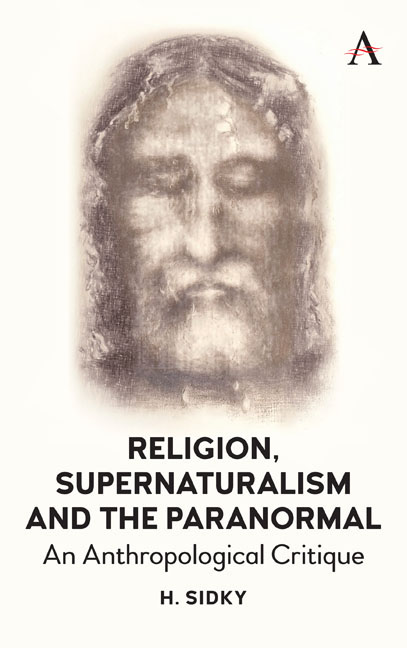Book contents
- Frontmatter
- Dedication
- Contents
- Acknowledgments
- Introduction
- Chapter One The Problem with Religion: Preliminary Issues
- Chapter Two The Unreal Real: The Supernatural, Religion, and the Paranormal
- Chapter Three Can Science Say Anything About Religion and the Supernatural?
- Chapter Four Ghostly Rappings, the Science of the Soul, and the Religious Nature of the Paranormal
- Chapter Five Ghostly Encounters in the Field: Anthropology of the Paranormal or Paranormal Anthropology?
- Chapter Six Why We Think the World Is Haunted
- Chapter Seven Cognitive Biases and Why People Think Eerie Thoughts
- Chapter Eight Miracles as Evidence of God's Actions in the World
- Chapter Nine When God Talks to People: Are Religious Experience Evidence of God?
- Chapter Ten Books Authored by God? Sacred Texts as Evidence of the Supernatural
- Chapter Eleven God's Fingerprints in the Natural World: Intelligent Design, Irreducible Complexity, and Cosmic Fine-Tuning
- Chapter Twelve The Miracles of the Bible: The Quintessential Foundations of Paranormal Beliefs in Western Culture
- Chapter Thirteen Jesus the Miracle Worker, Magician, and Sorcerer
- Chapter Fourteen Jesus's Empty Tomb, Missing Body, and Return from The Dead: Sources for the Paranormal Tale
- Chapter Fifteen The Post-Resurrection Appearances in the New Testament
- Chapter Sixteen Coping with Failed Prophesy: A Socio-Psychological Explanation for the Rise of Christianity
- Chapter Seventeen Conclusions: Why Religious and Paranormal Beliefs Persist and Their Dangers
- References
- Index
Chapter Sixteen - Coping with Failed Prophesy: A Socio-Psychological Explanation for the Rise of Christianity
Published online by Cambridge University Press: 16 December 2019
- Frontmatter
- Dedication
- Contents
- Acknowledgments
- Introduction
- Chapter One The Problem with Religion: Preliminary Issues
- Chapter Two The Unreal Real: The Supernatural, Religion, and the Paranormal
- Chapter Three Can Science Say Anything About Religion and the Supernatural?
- Chapter Four Ghostly Rappings, the Science of the Soul, and the Religious Nature of the Paranormal
- Chapter Five Ghostly Encounters in the Field: Anthropology of the Paranormal or Paranormal Anthropology?
- Chapter Six Why We Think the World Is Haunted
- Chapter Seven Cognitive Biases and Why People Think Eerie Thoughts
- Chapter Eight Miracles as Evidence of God's Actions in the World
- Chapter Nine When God Talks to People: Are Religious Experience Evidence of God?
- Chapter Ten Books Authored by God? Sacred Texts as Evidence of the Supernatural
- Chapter Eleven God's Fingerprints in the Natural World: Intelligent Design, Irreducible Complexity, and Cosmic Fine-Tuning
- Chapter Twelve The Miracles of the Bible: The Quintessential Foundations of Paranormal Beliefs in Western Culture
- Chapter Thirteen Jesus the Miracle Worker, Magician, and Sorcerer
- Chapter Fourteen Jesus's Empty Tomb, Missing Body, and Return from The Dead: Sources for the Paranormal Tale
- Chapter Fifteen The Post-Resurrection Appearances in the New Testament
- Chapter Sixteen Coping with Failed Prophesy: A Socio-Psychological Explanation for the Rise of Christianity
- Chapter Seventeen Conclusions: Why Religious and Paranormal Beliefs Persist and Their Dangers
- References
- Index
Summary
I've had to go a long way. I've given up just about everything. I've cut every tie: I've burned every bridge. I've turned my back on the world. I can't afford to doubt. I have to believe. And there isn't any other truth.
— Dr. Armstrong, a disappointed Sananda cult member (1956)Suppose an individual believes something with his whole heart; suppose further that he has a commitment to this belief, that he has taken irrevocable actions because of it; finally, suppose that he is presented with evidence, unequivocal and undeniable evidence, that his belief is wrong: what will happen? The individual will frequently emerge, not only unshaken, but even more convinced of the truth of his beliefs than ever before. Indeed, he may even show a new fervor about convincing and converting other people to his view.
— Leon Festinger et al., When Prophecy Fails (1956)Hardly had the report arrived from Aleppo that Elijah had appeared in the Old Synagogue there, and Elijah walked streets of Smyrna. Dozens, even hundreds, had seen him: he was the anonymous beggar asking for alms, as well as the as the invisible guest, at every banquet.
— Gershom Scholem, Sabbatai Șevi (1973)The stunning speed with which this belief has spread in the absence of a scintilla of evidence should capture the attention of all historians who have struggled to explain and reconstruct the development of early Christian beliefs in the resurrection and the empty tomb.
— David Berger, The Rebbe, the Messiah and the Scandal of Orthodox Indifference (2008)As discussed in the previous chapter, two concurrent processes came into play to generate the resurrection beliefs of the early Christians: (1) grief hallucinations; (2) the psychological process involved in coming to terms with the disconfirmation of deeply held beliefs. In this chapter, I shall look specifically at how the Jesus cultists came to terms with their shattered dreams and disappointment after the unexpected execution of their rabbi and how these efforts contributed to the development of Christianity.
Seeing the apparition of Jesus was a powerful force that convinced the cultists what they already anticipated based on their background beliefs that their teacher had been glorified and ascended to heaven to remain with the Most High but would shortly after that return to inaugurate the Kingdom of God on earth.
- Type
- Chapter
- Information
- Religion, Supernaturalism, the Paranormal and PseudoscienceAn Anthropological Critique, pp. 405 - 424Publisher: Anthem PressPrint publication year: 2019



